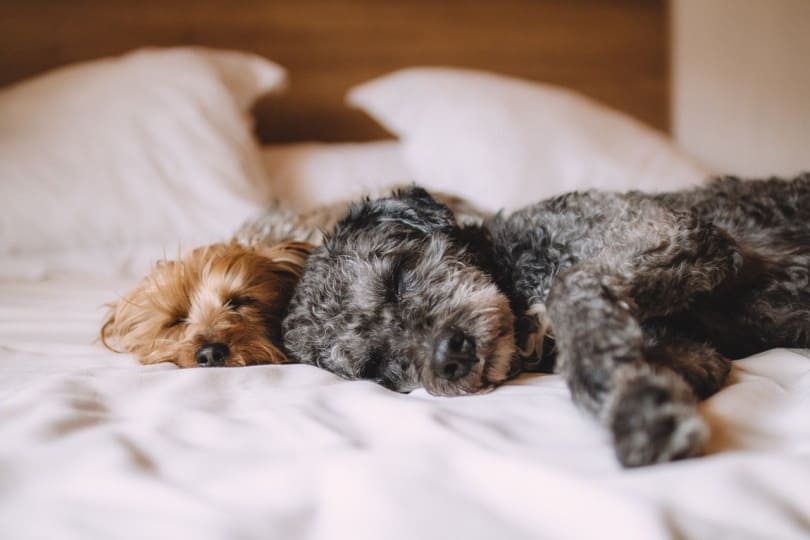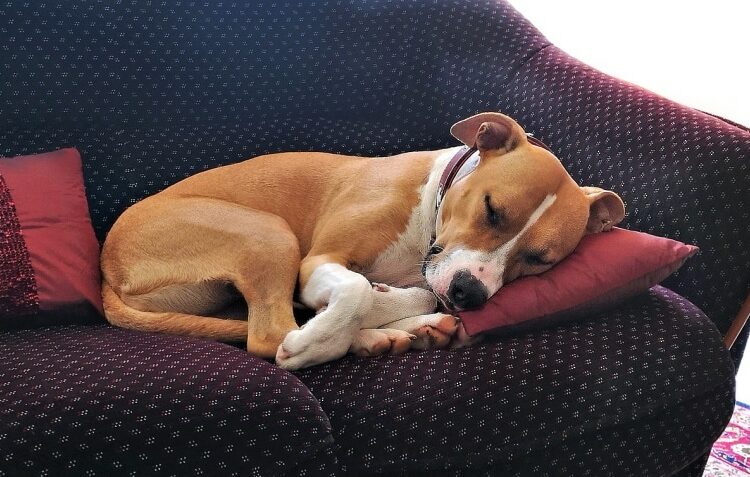Does it seem like your dog sleeps all day? Or they used to be active and energetic, but now they laze around taking naps? Dogs’ sleep needs change throughout their lives. They need plenty of sleep as puppies, less as mature adults, and more again as they age. Humans and dogs have one thing in common: Their sleep needs change according to their age and health circumstances. But the amount of sleep that they need is different.
How Much Do Dogs Sleep?
Dogs sleep a good deal, at least compared to humans. While the average human sleeps between 7 and 9 hours each night, dogs sleep between 12 and 14 hours. They don’t sleep all at once as we do, but they will spend approximately half of each 24-hour day asleep.
Humans operate on what is called a diurnal sleep schedule. This means we sleep at night and stay awake during the day, then repeat the cycle. If you maintain good sleep habits, you should get an average of 7–9 hours each night and be able to stay alert during the day.
Dogs don’t operate on a diurnal schedule, and they rarely meet their sleep needs all at once. While many dogs sleep through the night along with their family, they also take naps during the day as it suits them. Dogs can be described as “social sleepers” because they adjust their sleep habits to coincide with those around them. Our dogs want to be awake when we are, so they adjust accordingly.

Puppies and Senior Dogs Need More Sleep
Puppies need much more sleep than adult dogs. It may seem like your puppy sleeps all day long. Growing puppies need up to 20 hours of sleep a day. Growing takes a large amount of energy, and most puppies spend their awake time playing and learning how to behave in their home. Their bodies need plenty of rest to recover from all this work.
Puppies are great nappers but are often terrible at sleeping through the night. If you are a tired new puppy parent, rest assured that it gets better as they grow. Part of the reason young puppies can’t sleep through the night is that they are learning to control their bladder. They can’t hold it for long, and most learn quickly that it’s best to wake you when they need to go!
Dogs slow down as they age, much like people, which means they need more recovery time from their activities. It’s normal for senior dogs to sleep more or be a bit calmer than before. But if your dog seems to lack their usual enthusiasm for activities that they normally love or are struggling to stay awake, it can be a sign of an underlying condition.
Regular wellness checkups with your vet can help ensure that your dog stays healthy well into their senior years.
Sleep Needs Vary According to Breed
In general, large dogs sleep more than small dogs. It may be because they have to expend more energy in their daily activities. Larger dogs also tend to have more energy than their small breed counterparts and have more weight to carry around.
Certain dog breeds are prone to being lazy, but high-energy, active breeds usually sleep better through the night. Working breeds nap less during the day, so they have a sleep pattern reminiscent of humans.
Final Thoughts
Adult dogs sleep an average of 12–14 hours per day but don’t get all their sleep at once. Puppies and senior dogs will have different sleep needs, and their breed and activity level also determine how much they sleep. Dogs often adapt their sleep style to their owners’ lifestyle and sleep schedule, so not all dogs sleep the same amount.
Featured Image Credit: Pixabay














